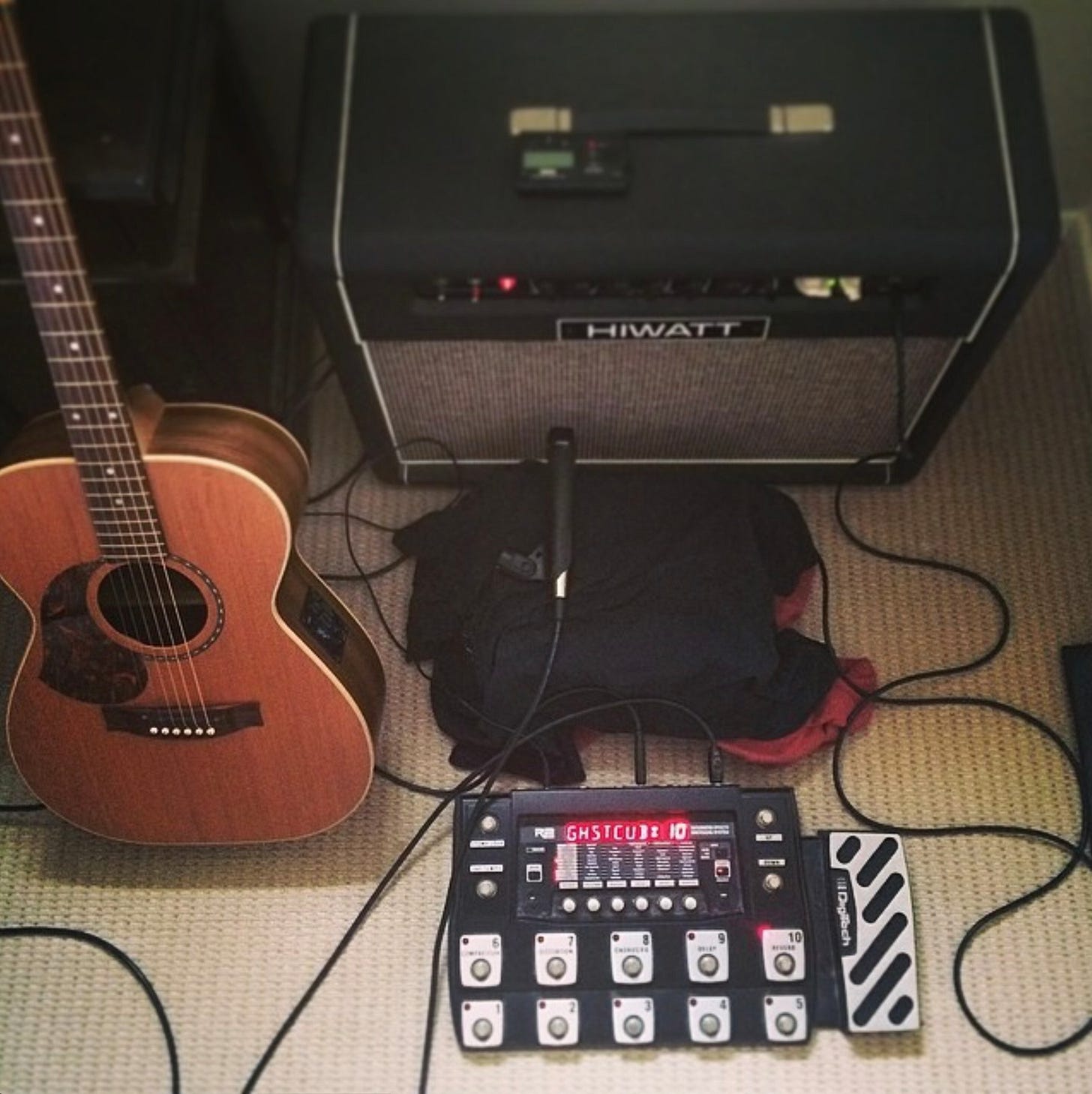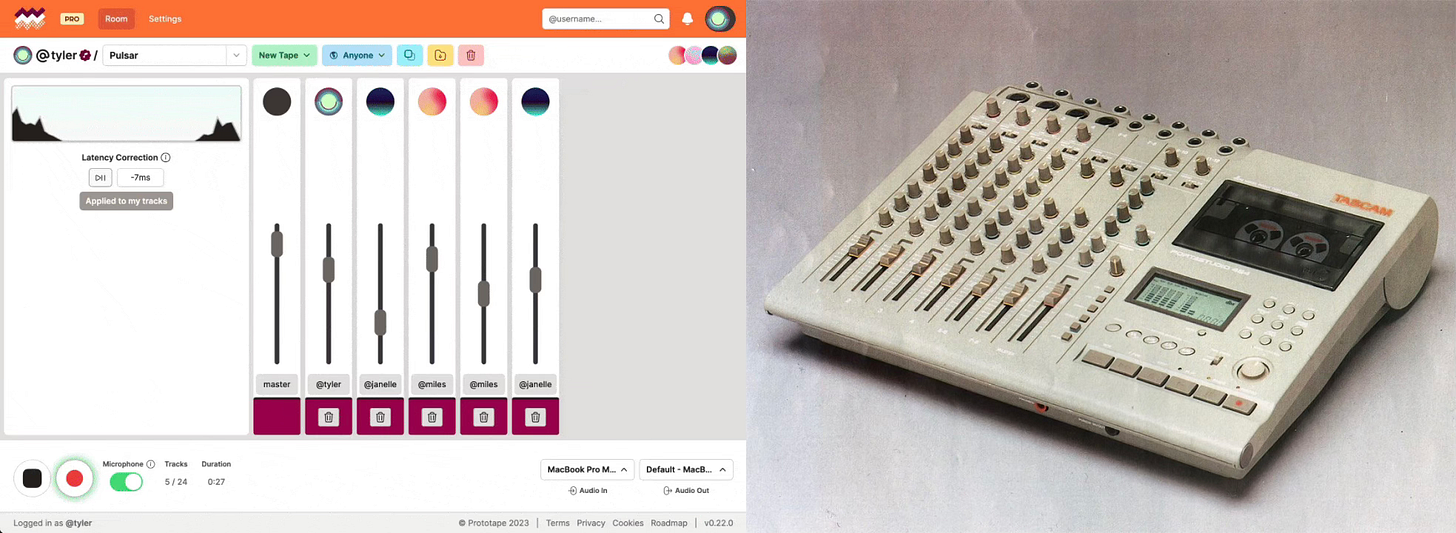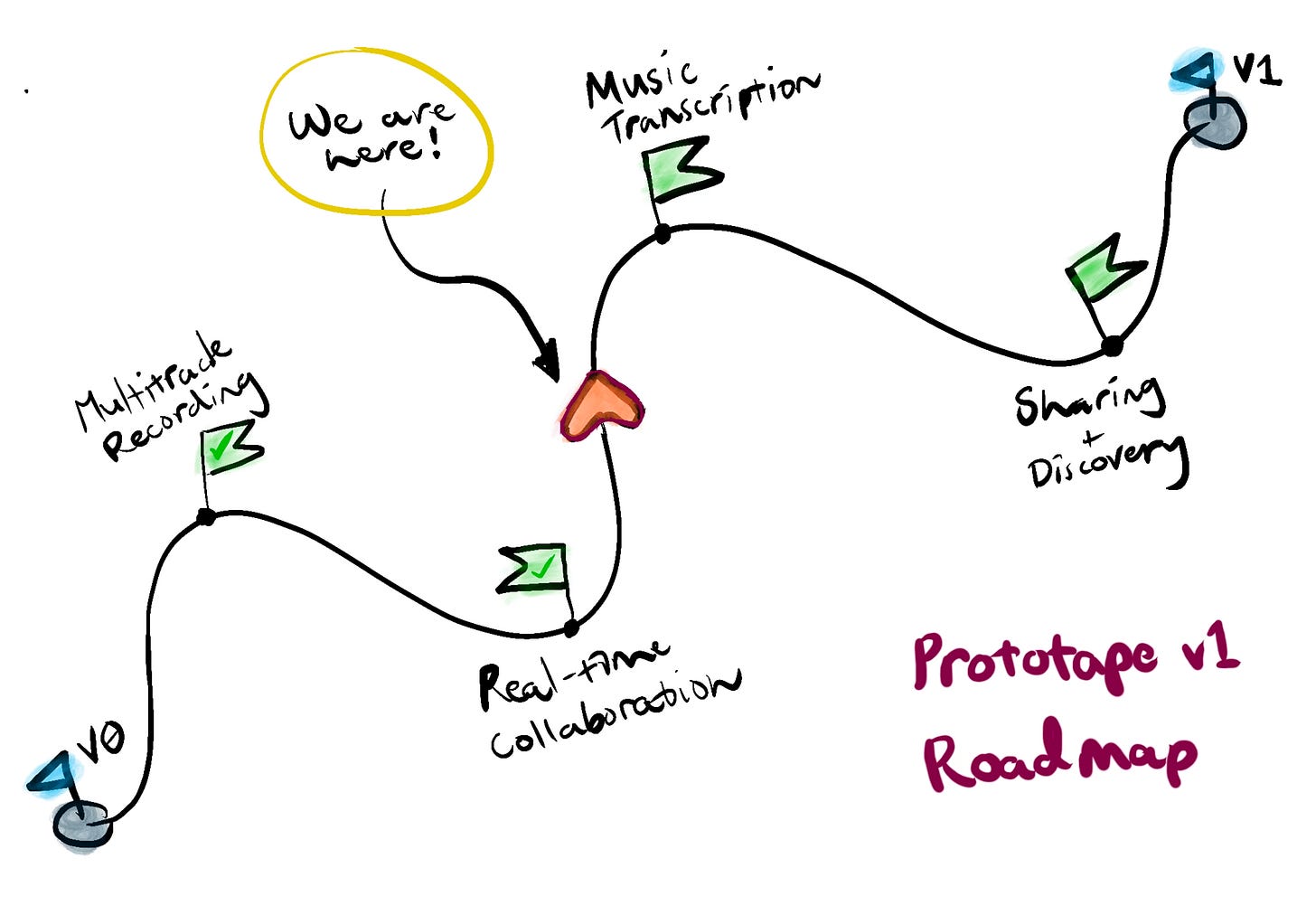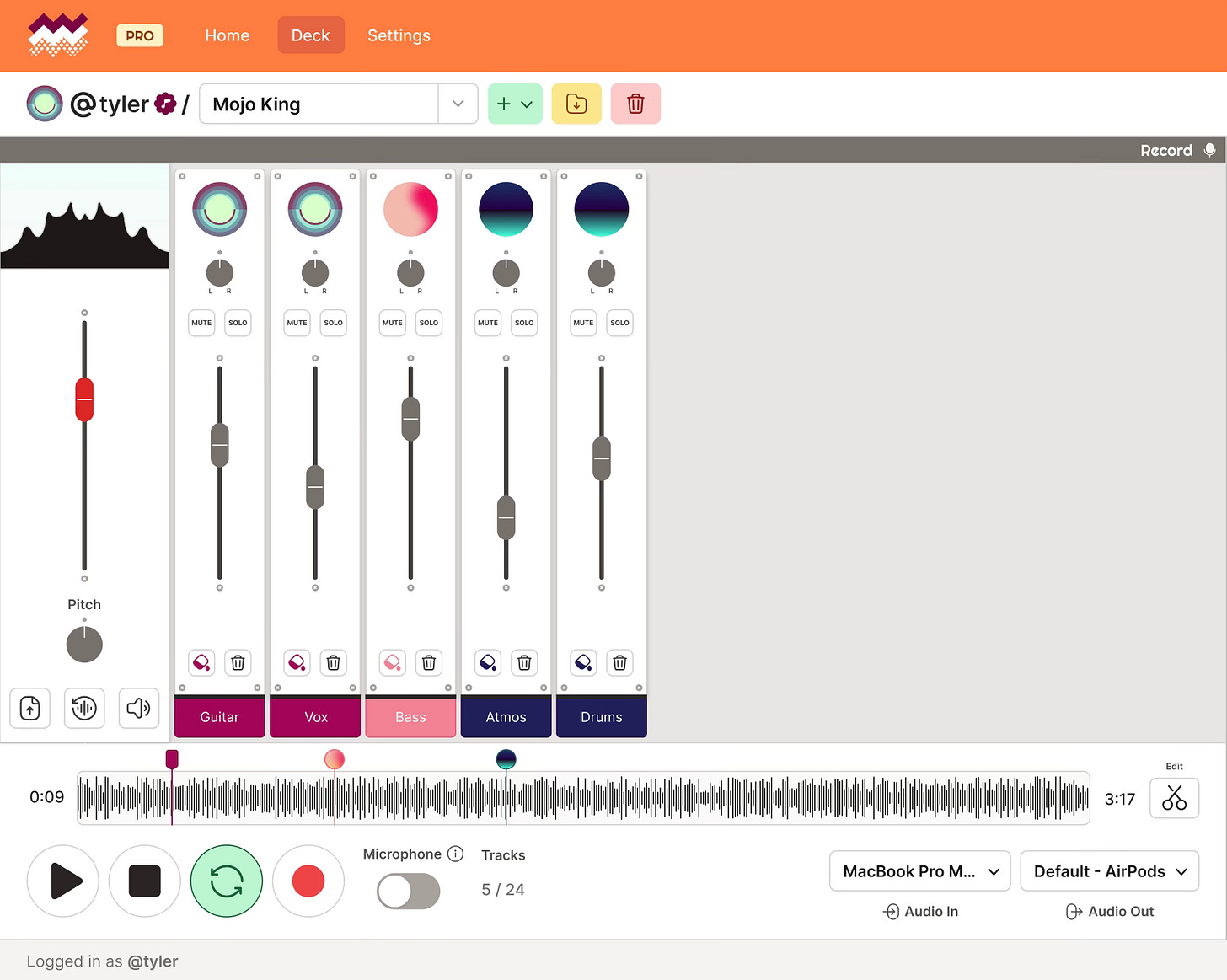Digital Audio Songbook: A Love Letter to My Unfinished Songs
How a Collection of Years Old Voice Memos Inspired a Startup
Unfinished idea circa 2015
Musicians are usually reluctant to admit that they listen to their own music. Maybe it seems self-indulgent, or that doing so must mean you’re full of yourself. But if you’ve made any music at all, you’ve made it because you like the way it sounds. Every chord, every note, or phrase is in there because you were into it. Why wouldn’t you listen?
Old songs, whether you wrote them or not, can take you back in time. But sometimes you’re looking for a more potent dose of nostalgia, a real punch in the face. For this, just listen to the songs you never finished. The voice memos and half-baked DAW projects that still hold a potential you’ll only rub off by taking any further. If only you could find the time, the energy, or the right collaborator…
I revisit these enough that one day I thought - enough! - I need to finish these songs I should create an app to help me finish these songs. Not a Digital Audio Workstation, a Digital Audio Songbook.
Imagine if SoundCloud was not just the place you uploaded a finished track, but where you wrote and recorded it with other musicians. Picture your social profile not being somewhere you accumulated tweets, but songs, complete with lyrics, chord charts, and tabs. Instead of seeking inspiration through a playlist of polished releases on Spotify, you could open your DAS to find a diamond in the rough waiting for a vocal or guitar solo you can contribute.
This is the vision that started me building Prototape. It began as a side project in March 2022, but in August last year I quit my job to work on it full-time.
“You might say it was the ultimate procrastination project: I decided I needed to build my own writing tool before I could finish my writing.”
~ Keith Blount, creator of Scrivener
Why not use a Digital Audio Workstation?
Tools like Ableton, Logic, and Reason (my DAW of choice) package an entire studio’s worth of capability and instruments entirely within your laptop. Because of this, it’s never been easier to record professional quality music from your bedroom.
But the key phrase there is record professional quality music. To take a recording all the way to being release-ready requires a very powerful toolset, and with great power, comes great responsibility complexity. Most musicians I know didn’t spend the better part of a year studying sound at RMIT, only to neglect the “community service” part of the curriculum (see: free work), and forfeit getting the qualification as a result. But I digress.
What I’m saying is, tweaking plugins, presets, and compression ratios doesn’t write you a song. Even in Ableton, which has arguably the best ideation workflow of the bunch, I never fared much better. Oh, and if you’d like to collaborate with somebody remotely, I hope you have a Dropbox account and a passion for importing and exporting WAV files ad-nauseam.
Apps like Soundtrap and BandLab are trying to solve the collaboration problem, but 1) they’re bringing all the complexity along with them, and 2) they’re trying to completely replace your favourite DAW. Boo!
What would software made specifically for the songwriting phase look like?
Prototape is a Digital Audio Songbook
Unfinished Idea circa 2012
The most fun I’ve had writing music has been when workshopping ideas with a loop pedal, or playing with other people in-person. Any success in either department also requires some transcription, so you can teach bandmates how to play your tune, and so you don’t forget how to play it yourself (I’ve done this many times). This outlines three main components of a Digital Audio Songbook:
1. Multi-track Recording
2. Real-time Collaboration
3. Automagic Music Transcription
There’s also the matter of finding your collaborators. Perhaps you aren’t in a band yet, or you’d like to contribute to songs already in-progress by another artist. This means we also have a forth component to consider:
4. Social Sharing & Discovery
Put all of those things together and you end up with a really compelling place to write and record demos. It doesn’t need to replace your favourite DAW, because it compliments it. What I love about this is that it lowers the bar for sharing your music considerably. The ideas you love finally have a place other than your hard drive to call home.
One of my favourite artists, Kiefer, once said something along the lines of “music you create but don’t share essentially doesn’t exist”. How many great musicians don’t share their art with anyone because it’s not finished, or they don’t feel it’s good enough?
Music is easier to create than ever, there should be platforms which don’t carry the expectation of “done” to share it on. The joy of recording music with others, or recording music at all, should not be restricted only to those who aspire toward a professional career in it.
Looking Back for a Way Forward
Unfinished idea circa 2013
To succeed, Prototape must be simple to use. Where a huge number of musicians have adopted the DAW, many more still find them too technically intimidating. How can Prototape appeal to a broader scope of musicians?
This got me thinking about how often I’ve heard interviews in which older musicians wax lyrical about the multi-track tape recorders they cut their teeth on coming up. As it turns out, this was the technology that started the home recording revolution we now find ourselves in. The most notable example being the Tascam Portastudio. The original demo of George Michael’s Careless Whisper was recorded on the Portastudio. As was the entirety of Bruce Springsteen’s 1982 album Nebraska, and Elliot Smith’s debut Roman Candle. These are musicians, not sound engineers. If I can make Prototape a modern, multiplayer blend of the Portastudio, a loop pedal, and put it all in the browser - we might be in business.
You may be wondering where looping comes into play. Though loop pedals exist to enable a solo musician to layer tracks together without a band, the irony is this workflow holds the key to collaborating on music remotely, and in near real-time.
The Trouble With Latency
Unfinished idea circa 2011
Jamming with other musicians over the internet is an obviously valuable idea. Many tools have tried to make this a reality, be it over Zoom or using more specialised tools. You run into issues with this when you come into contact with the speed of light.
Latency, in this context, is the delay between the moment a sound is played by one musician and the moment it is heard by the other. This delay can disrupt the synchronicity required for musicians to play in time with each other. Less than 10 milliseconds of latency is generally considered imperceptible to humans and is the ideal target for real-time audio interactions. Once you’re above 10-25ms it starts to become noticeable and rules out playing music of any meaningful rhythmic complexity. Above 50ms and it’s nearly impossible to play in-sync with others.
Over the internet, you’re looking at latency of 20-100ms or more. This isn’t even the only variable - when you’re just recording into a DAW using an audio interface, no internet involved, there is still latency introduced by the interface and your laptop processing the signal; typically 1-10ms.
All of which is to say, jamming with other musicians over the internet today is at best extremely challenging, but for the most part completely untenable.
Layering audio with a looper is an entirely different dynamic: As long as all parties are getting new audio as it’s added to the project, you can simply play any new tracks received alongside the rest of the layers on the next loop. You don’t even need everyone’s playback to be in-sync.
This is how Prototape approaches remote collaboration.
Where is Prototape at today?
Unfinished idea circa 2012
At time of writing - late February 2024 - I’ve implemented both the multitrack recording and collaboration features. The next big piece is the AI transcription toolkit. This consists of two major components:
1. Chords & Key: When you record a track, Prototape will analyse the audio file to detect all the chords contained within it, as well as the root key it’s in. Not only will this save time transcribing your song so you can remember how to play it, it will also leverage this information to suggest other chords and progressions in the same key. You can use this information to write other sections, and ultimately finish your song.
2. Lyrics Transcription: If your track contains vocals, Prototape will write your lyrics down for you. Down the line I’ll also be integrating an AI assistant which can provide feedback on your lyrics, and help you expand on themes you’ve already brought to the table. I firmly believe in augmenting songwriters with AI, not replacing them.
This is in-progress, but there’s also some important user feedback to juggle and address alongside it. I won’t list it all here, but notably:
1. Pause: It may sound ridiculous, but as of today you can’t pause playback of your song. When you click stop, playback will start from the beginning the next time you click play. As it turns out - quite obviously, in hindsight - this makes it tricky to overdub on longer tracks, because you can’t easily punch-in to record from a particular timestamp. Instead, you’ve got to play the song and hit record at the right time. A little embarrassing, but this kind of oversight can happen when you’re building something like this solo as I am.
2. Uploading multiple audio files: You can create a new tape from an audio file you import, but you can’t upload multiple files. This is often the case if you’re exporting stems from Ableton, for example. I’ll fix this too.
3. Mobile views: Nowadays, most people record demos on their phone using Voice Memos or something similar. Naturally, a lot of folks try to use Prototape on their phone - go figure. Since Prototape is a browser application, this is tricky for device compatibility reasons. For now I’m prioritising desktop use, but rest assured this is on my radar and it will be addressed.
The list goes grows on, but these are top of mind. You can also check out the roadmap for other things I’ve got planned. A better social and discovery story is important too, but there’s not much use leaning into making Prototape a social network until it’s rock-solid as a songwriting tool.
Let’s Make This a Reality
Unfinished Idea circa 2013
If the vision for Prototape resonates with you, you can start using it today! I want to hear your feedback and suggestions so I can make it the best place to write songs on the internet for as many people as possible.
I have no investors, this is an independent operation I started because it’s the songwriting tool I want to exist, and I want to get it right. This is also my full-time job: If you believe in it, do consider subscribing to the Pro plan to help me keep the lights on, and the dream alive.
If you’d like to stay updated, just opt-in to the mailing list when you sign up, or subscribe to this newsletter. ✌️






